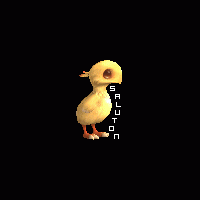The "iĉ" suffix:
من Aubright, 15 يناير، 2013
المشاركات: 54
لغة: English
Aubright (عرض الملف الشخصي) 15 يناير، 2013 5:58:53 ص
(For those who may not know, Esperanto is criticized as being sexist because some words are by default masculine (Patro) and the feminine (Patrino) is derived from them only when specified. The -iĉ- suffix (alone with SEVERAL others) seeks to take away the inherent masculine meaning and make a word only masculine when specified, ie. putting it even with the feminine.) Now that that is out of the way I do want to say PLEASE correct me if I have a basic misunderstanding of what it is I am posting about. I am perfectly capable of changing my opinion if it is proven wrong or otherwise inaccurate. Thanks in advance everyone

Maverynthia (عرض الملف الشخصي) 15 يناير، 2013 7:58:43 ص
Honestly I'd just ditch the use of that word piĉo, strike it from the vocabulary and bring in nepiĉo for grandson and nepino for granddaughter. Esperanto wants to say it's about equality and all that but.. why have a horrible slang word against women? Because it's slang? I would think having a hateful slang word over a adopting a suffix to make the language less sexist would go against Esperanto's message of equality and peace.
Honestly when I get more experienced in Esperanto I too am going to use -iĉo and people can be horrible and snicker behind their hands if they ever hear 'grandson'.
Really, Esperanto and it's sexism is touchy for me because I see proposed changes, yet people seem to not want to adopt them because "It'll confuse people!", "You won't be able to read anything anymore! The word will catch fire! DOOM!" "It goes against the 'Esperanto Bible'" (I forget the name of it but the Fundamental book thing people quote about.)
THEN I see people in other threads talking about -iĝi and fariĝi (something like that) and such and then basically being told "Yeah that way was the OLD way of saying it, but this is the newer/commoner way that everybody does." and then I just headdesk. If you can teach Esperanto with just pictures and cartoons (Mazi en Gondolando) then people can certainly pick up in context what -iĉo would mean.
Then you get the people that want to cling on to Esperanto being a "default male" language, where you other the women and female stations/animals (instruistino, katino, etc.) with endings like the -ess and -ette suffixes in English/French/Etc., by suggesting vir- (Which is very inconsistent considering Esperanto genders things with suffixes and not prefixes. It only DEgenders things with prefixes.) to "if you absolutely HAVE to point out it's male". Which comes off to me as "Gods person! Esperanto is already male by default, now why would you want to go and actually point out something is male! But if you Haaaaaave to, use that!" That and 'viro' means man so saying 'virhundo' makes me think "mandog". (Really someone could try to have a fantasy race of Man-dogs in their writings! How would you say male-man-dog! Virvirhundo? D

SUMMARY! If people are going to accept other ways to use other suffixes/words why NOT use -iĉo, the Grand Esperanto Council be ignored. It's not like we are trying to 'Ido-ize' it.
novatago (عرض الملف الشخصي) 15 يناير، 2013 9:31:20 ص
Maverynthia:The reason is easy to understand: It creates confusion with the esperanto system. It's not compatible with the esperanto system, because there are already 125 years of writings and recordings that use the esperanto system and it would make mandatory to learn two ways of doing something that now works fine with only one way, it would make mandatory almost every time to guess what system someone is using, because with the "aĉa" system it is very unusual to use the "aĉa" suffix. So, if we still depends on context to understand something, what the hell is solving that suffix?
SUMMARY! If people are going to accept other ways to use other suffixes/words why NOT use -iĉo, the Grand Esperanto Council be ignored. It's not like we are trying to 'Ido-ize' it.
So, it is proposed a "solution" for a no-problem; a "solution" that makes problems, and adds a useless thing to learn, in a language that aims to be easy to learn. Congratulations to all people who is supporting that kind of idea.
It's a monstrous change to the fundamento, which became untouchable, precisely to avoid this kind of "great" ideas. And that, without talk about THE BIG INSULTING LIE about sexism in esperanto. I haven`t seen yet how that change ovoids the sexism; a sexist person could be totally comfortable using that suffix because it makes an even more very remarkable difference between genres.
I already lost a lot of hours of my life talking about this stupid thing. So I have no intention to reenter in this thread. And I suggest every body, to use esperanto if you really want help, instead to talk about it.
Ĝis, Novatago.
efilzeo (عرض الملف الشخصي) 15 يناير، 2013 10:22:15 ص
Some people are really obsessed about self-made problems. I wait the moment in which feminists will start to fight against the female role in natural herds.
tommjames (عرض الملف الشخصي) 15 يناير، 2013 10:50:41 ص
Aubright:I am all for the -iĉ- suffix being put into use, but I would like to hear other peoples thoughts on the matter before I decide whether or not to add it to my vocabulary.My advice would be not to bother with it. Virtually nobody uses -iĉ, so by using it you will sound odd, or perhaps mark yourself out as a supporter of useless reform proposals more generally. That may not bother you at all, but it's worth bearing in mind.
erinja (عرض الملف الشخصي) 15 يناير، 2013 11:41:58 ص
This is a topic that has been done to death, Aubright. Try typing iĉ into the search box and looking at some of the old threads.
Aubright (عرض الملف الشخصي) 15 يناير، 2013 2:47:36 م
Aubright (عرض الملف الشخصي) 15 يناير، 2013 2:52:02 م
Aubright (عرض الملف الشخصي) 15 يناير، 2013 3:37:45 م
Tempodivalse (عرض الملف الشخصي) 15 يناير، 2013 3:48:00 م
My problem with -iĉ- is that it would add extra syllables to common words. If "knabiĉo" is "boy" and "knabino" is "girl", then what is "knabo" ? Is it just "child", without reference to gender? Then "ge-" becomes redundant. With longer constructions, "psiĥologiĉo" or "ĉefdirektoriĉo" just look bad.
The "vir-" prefix I can understand a little better. It's at least a Fundamento root and maybe there are genuinely cases where you need to stress the masculinity of something. Still, to apply it everywhere would make the language a lot more cumbersome.




